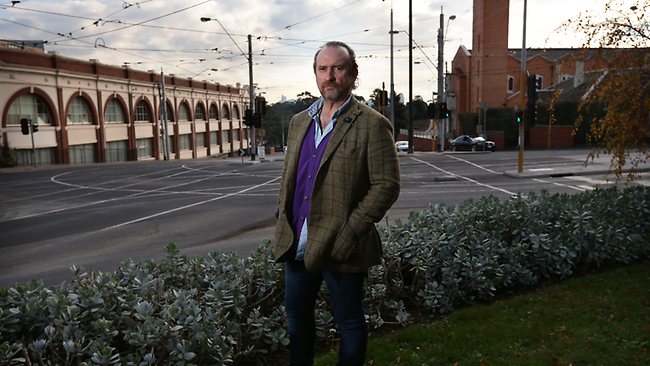
Picture: Stuart Mcevoy Source: The Australian
THE corner of Riversdale Road and Power Street in Melbourne’s Hawthorn holds significant memories for Colin Hay. It’s where the Men At Work singer came up with the words for Down Under.
“I had this line ‘living in a land down under’ in my head for a few weeks. (Co-writer) Ron (Strykert) had given me a cassette of a rather intriguing percussion and bass idea,” he recalled.
“I remember driving down Power Street in Hawthorn and singing the line over the tape.
“I sang it over and over all the way home, and the next morning the rest of the words and music popped out in about an hour or so. I knew we had something.”
Little could he have known in 1978 that Down Under would become one of the most popular Australian songs of all time, or that the worldwide hit would be the subject of a damaging lawsuit 28 years after the Men At Work single was released in 1982.
The lawsuit, brought against Hay and band member Strykert and their publishers and record company, resulted in 5 per cent of the recording’s royalties being awarded to Australian publishers Larrikin Music.
Larrikin claimed the flute motif on the track, played by band member Greg Ham, plagiarised the old Australian folksong Kookaburra Sits in the Old Gum Tree, to which it holds copyright.
That ruling is partly why California-based Hay, who claims the infringing flute part is innocuous, is releasing three new versions of the song next week with the flute part removed or altered.
“I just did it because I could,” said Hay, who was revisiting Power Street on a short visit to Melbourne.
“I wanted to put it out there and say: ‘here it is without the infringing flute line and it doesn’t make any difference’. It’s still the song.”
Ham, who Hay says was devastated at being labelled a plagiarist by the court ruling, was found dead at his Melbourne home in April. The cause of death is unknown.
“That was a tragic element to the whole thing,” said Hay. “Greg bought into that negative press about the appropriation of those bars. He felt awful about the fact that he played the line and yet it was Ron and I who got sued.
“My last conversations with him were trying to say: ‘look, people are not going to remember anything about this, really. People like the song.’ “
Hay made the recordings — one acoustic, one a remix of the original master and the other a live band version — in 2010. The tracks will be released, on iTunes only, next Friday.
Strykert was not involved in the new recordings and the two have not spoken for some years. Strykert was absent from the court proceedings.
“He hasn’t been party to anything for years,” Hay said. “I don’t know where he is and I don’t know anybody who knows where he is.”
Proving the song’s merits regardless of the flute line is only one reason why Down Under is about to re-enter the public consciousness. The other is that on its 30th anniversary the song is being used by Telstra in a television advertising campaign for the Olympic Games. Hay has been involved in the campaign and has been filmed for the ads in Australia and London, performing the unofficial anthem with enthusiastic Aussies.
Hay said the financial implications of the court case had no bearing on his decision to become involved in the Telstra campaign.
“Compared to the cost of the court case the fee for the ad is minimal,” he said.
“It’s a drop in a bucket and the cost of the court case was in the millions.”
Source: The Australian
